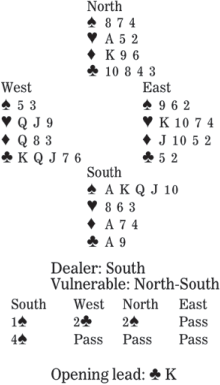How well do you spot the spots?
By Phillip Alder ( China Daily ) Updated: 2017-01-21 11:18:57
 |
|
[Photo/China Daily] |
Mark Twain said, "I was born modest; not all over, but in spots."
One aspect of bridge that separates the top players from others is taking full advantage of the useful spot cards (2 through 10)-in particular, knowing when a low spot is a winner.
How is that relevant in today's deal? After West leads the club king, how should South proceed in four spades? Did West have a more successful opening lead?
South's jump to four spades was a slight overbid with a six-loser hand, but we tend to bid game with any excuse. Of course, here, if South had chosen to rebid three no-trump, North would surely have passed, and declarer would have had nine top tricks. (Also, there was a case for West's making a takeout double over one spade, not a two-club overcall. It would not have made much difference here, but the double would have been more flexible.)
In four spades, though, South has only those same nine tricks; he is faced with four losers: two hearts, one diamond and one club. Is there any hope?
Look at those interesting club spots. Declarer should win the first trick, draw trumps and return the club nine. Suppose West finds the best defense, taking the trick and shifting to the heart queen. South wins on the board, leads the club 10 and discards a heart loser. Yes, West takes that trick and cashes a heart winner, but South's diamond loser evaporates on the now-high club eight.
If West had led anything other than a club, the contract would have failed.
|
|
|
|
|
|
|
|

























 Raymond Zhou:
Raymond Zhou: Pauline D Loh:
Pauline D Loh: Hot Pot
Hot Pot Eco China
Eco China China Dream
China Dream China Face
China Face






